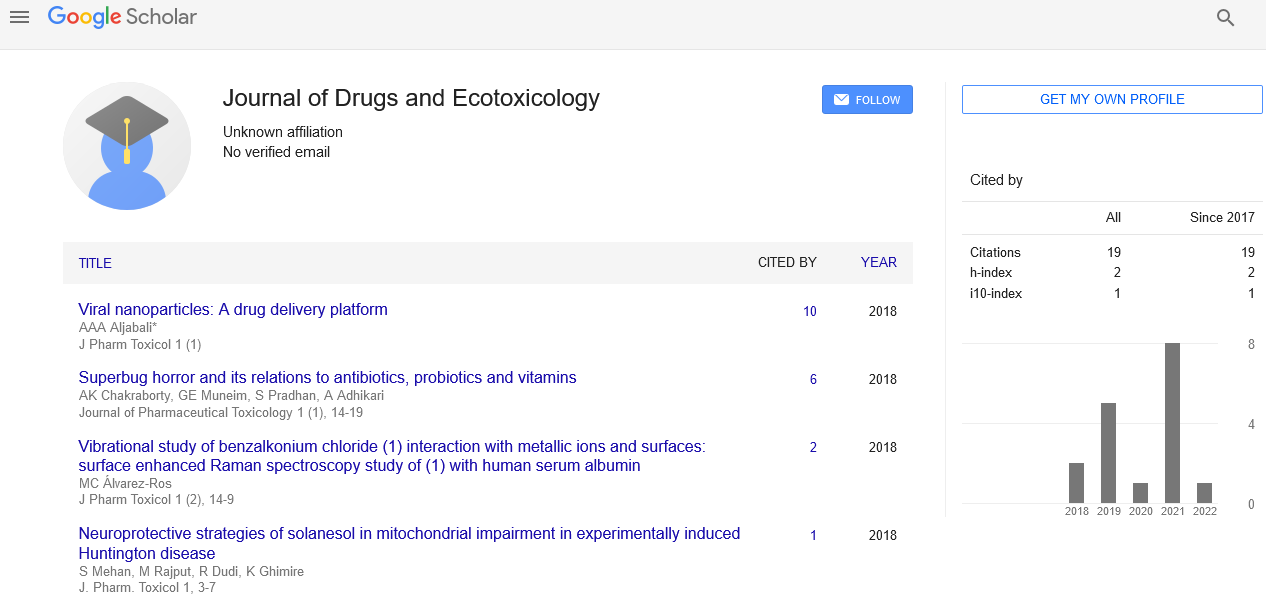Excessive immune response on attack of various toxics
Received: 07-Jan-2022, Manuscript No. puljde-22-4567; Editor assigned: 11-Jan-2022, Pre QC No. puljde-22-4567; Accepted Date: Jan 20, 2022; Reviewed: 20-Jan-2022 QC No. puljde-22-4567; Revised: 21-Jan-2022, Manuscript No. puljde-22-4567; Published: 25-Jan-2022, DOI: 10.37532.puljde.22.5.1.4
Citation: Eliana Hoffman. Excessive immune response on attack of various toxics J Drug E. 2022: 5(1):1
This open-access article is distributed under the terms of the Creative Commons Attribution Non-Commercial License (CC BY-NC) (http://creativecommons.org/licenses/by-nc/4.0/), which permits reuse, distribution and reproduction of the article, provided that the original work is properly cited and the reuse is restricted to noncommercial purposes. For commercial reuse, contact reprints@pulsus.com
Introduction
In medicine and biology, immunology is the study of the immune system. Autoimmunity, allergies, and cancer are among the disorders that can arise when the immune system isn't functioning properly. Immune responses are increasingly being proven to have a role in the development of a range of common maladies that were previously assumed to be immune-related, such as metabolic, cardiovascular, and neurodegenerative diseases like Alzheimer's disease. Tumour immunology is the study of the relationship between immune function and tumour cells, which is important for comprehending tumour rejection and progression. Tissue-resident and blood-derived cells, as well as the immune systems involved in cancer growth, are exceedingly complex. Tissue-resident and blood-derived cells, as well as immune systems implicated in the development of cancer, are exceedingly complex. The human immune system generates an endogenous response to highly immunogenic tumour cells. The process of shifting cells, tissues, or organs from one location to another, either inside the same person or between a donor and a recipient, is known as transplantation. An organ system can be replaced with a healthy organ or tissue from a donor if it fails or becomes damaged as a result of disease or injury. Organ transplantation is a serious procedure that is only considered when all other therapeutic options have been exhausted. As a result, it's frequently a life-saving procedure. To regulate viral and bacterial infection, the immune system has developed a number of strategies, ranging from direct pathogen killing to the production of cytokines that impede reproduction. Pathogens have developed a range of immune evasion methods to evade immune detection of infected cells by inhibiting cytokine activity.
The immune response in autoimmune illness is similar to that seen in infections, with the exception that self-antigens are (or become) the adaptive immune system's target. These self-antigens may be responsible for a process that is exclusive to a single organ. When our immune system assaults our own tissues, we get autoimmune disease. T-cell receptors and B-cell receptors, like other adaptive immune responses, are focused on specific antigens. In contrast to infection, the antigens recognized by these cells are processed from proteins inside the target organ, resulting in a persistent inflammatory response that affects the tissue's normal function.
Companies that offer medical services, produce medical equipment or medications, offer medical insurance, or otherwise enable the delivery of healthcare to patients make up the healthcare industry. Healthcare markets are characterized by a number of important variables from an economic standpoint. Because of some of these economic variables, government engagement in healthcare markets and activities is widespread. Diagnostic immunology, also known as immunodiagnostics, is a set of tests and methods used to diagnose hypersensitivity, asthma, and infectious diseases such as AIDS, rheumatoid arthritis, multiple sclerosis, and type 1 diabetes. Measure units, instruments, and administrations are all part of the sensitivity analysis. Other analytic approaches include histology and immunology examinations, subatomic techniques, and insusceptible framework assessment. Immunotoxicology is the study of systemic effects that occur as a result of direct or indirect exposure to chemicals, biologic materials, and, in some cases, physiological variables, collectively referred to as agents, during occupational, environmental, or therapeutic exposure. It includes research on altered immunologic events linked to human and animal species exposure, as well as immunological regulation. The process of creating and developing vaccinations that include biological agents that are almost identical to disease-causing bacteria in weakened forms, implying that the pathogenicity of the microorganism vaccines is destroyed. A vaccination is a substance that resembles a disease-causing germ and is frequently manufactured from weakened or destroyed microorganisms, their toxins, or one of their surface proteins. The agent induces the body's system to recognize the agent as a threat, eliminate it, and destroy any similar bacteria it may meet in the future.





